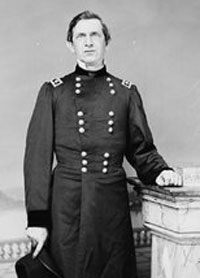Edward Richard Sprigg Canby (1817-1873)
Edward Richard Sprigg Canby (November 9, 1817 April 11, 1873) was a career U.S. Army officer and a Union general in the American Civil War and Indian Wars.
 Canby was born in Piatt's Landing, Kentucky. He attended Wabash College, but transferred to the U.S. Military Academy, from which he graduated in 1839. He was commissioned a second lieutenant in the 2nd U.S. Infantry and served as the regimental adjutant. During the Mexican-American War, he received three brevet promotions, including to major for Contreras and Churubusco and lieutenant colonel for Belén Gates.
Canby was born in Piatt's Landing, Kentucky. He attended Wabash College, but transferred to the U.S. Military Academy, from which he graduated in 1839. He was commissioned a second lieutenant in the 2nd U.S. Infantry and served as the regimental adjutant. During the Mexican-American War, he received three brevet promotions, including to major for Contreras and Churubusco and lieutenant colonel for Belén Gates.
At the start of the Civil War, Canby was in command of Fort Defiance, New Mexico Territory. He was promoted to colonel of the 19th U.S. Infantry on May 14, 1861, and the following month commanded the Department of New Mexico. He prevented Confederate Brigadier General Henry Hopkins Sibley from reaching Colorado and California and defeated him in the decisive Battle of Glorieta Pass. Canby was promoted to brigadier general on March 31, 1862, immediately following this victory.
Canby spent a good part of 1863 in New York City and then as the Assistant Adjutant General in the office of the Secretary of War until May of 1864, when he was promoted to major general. He returned to the West to command the Military Division of Western Mississippi. He was wounded in the hip and groin from a sniper while aboard the gunboat USS Cricket on the White River, Arkansas, on November 8, 1864. Canby commanded the Union forces at the Battle of Fort Blakely, which led to the fall of Mobile in 1865.
After the war, Canby served as commander of the Army and Department of the Gulf, the Department of Louisiana and Texas, the Department of Washington, and the Second and Fifth Military Districts. In 1873 he was sent to California to fight in the Modoc War. The Modocs, entrenched in Captain Jack's Stronghold south of Tule Lake, resisted army attacks so effectively that a peace conference was arranged. General Canby was shot twice in the head and killed by Captain Jack, chief of the Modocs, on April 11, 1873, at Van Bremmer's Ranch, Siskiyou County, California. He was the first, and only, general killed during the Indian Wars. He is buried in Crown Hill Cemetery, Indianapolis, Indiana.
In recognition of his assassination, Canby's Cross monument was erected in Lava Beds National Monument. The town of Canby in Clackamas County, Oregon, is named for him.
 Canby was born in Piatt's Landing, Kentucky. He attended Wabash College, but transferred to the U.S. Military Academy, from which he graduated in 1839. He was commissioned a second lieutenant in the 2nd U.S. Infantry and served as the regimental adjutant. During the Mexican-American War, he received three brevet promotions, including to major for Contreras and Churubusco and lieutenant colonel for Belén Gates.
Canby was born in Piatt's Landing, Kentucky. He attended Wabash College, but transferred to the U.S. Military Academy, from which he graduated in 1839. He was commissioned a second lieutenant in the 2nd U.S. Infantry and served as the regimental adjutant. During the Mexican-American War, he received three brevet promotions, including to major for Contreras and Churubusco and lieutenant colonel for Belén Gates.